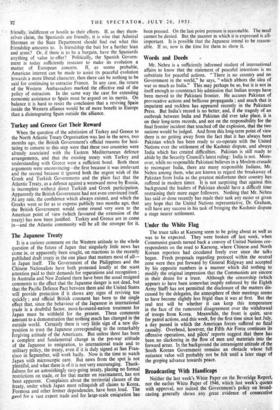The Japanese Treaty
It is a curious comment on the Western attitude to the whole question of the future of Japan that singularly little news has come in, or apparently been sought, on reactions to the recently published draft treaty in the one place that matters most of all— in Japan itself. The Government of the Philippines . and the Chinese Nationalists have both protested loudly at the scant attention paid to their demands for reparations and recognition • in Australia and New Zealand there have been the usual resigned comments to the effect that the Japanese danger is not dead, but that the Pacific Defence Pact between them and the United States will provide protection if it shows any signs of reviving too quickly ' - and official British comment has been- to the single effect that, since the behaviour of the Japanese in international trade is a doubtful factor, most-favoured-nation treatment for Japan must be withheld for the present. These comments amount to a demonstration that nothing much has changed in the outside world. Certainly there is very little sign of a new dis- position to trust the Japanese corresponding to the remarkably forgiving attitude of the Americans. But unless there has been a complete and fundamental change in the pre-war attitude of the Japanese to emigration, to international trade and to military policy, the treaty, even if it is duly signed at San Fran- cisco in September, will work badly. Now is the time to watch Japan with microscopic care. But news from the spot is not plentiful, and what there is of it is not very encouraging. Thank- fulness for an astonishingly easy-going treaty, placing no formal restrictions on trade, or for that matter on rearmament, has not been apparent. Complaints about the territorial clauses of the Treaty, under which Japan must relinquish all claims to Korea, Formosa and other former dependencies, have been loud. The weed for a vast export trade and for large-scale emigration has - been pressed. On the last point pressure is reasonable. The need cannot be denied. But the manner in which it is expressed is all- important. It is possible that the Japanese intend to be reason- able. If so, now is the time for them to show it.


































 Previous page
Previous page